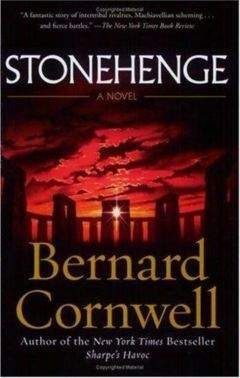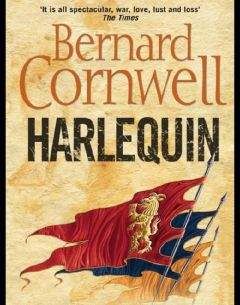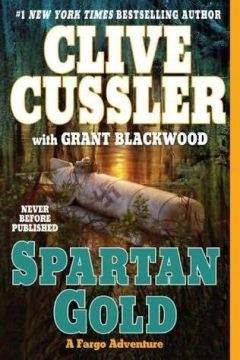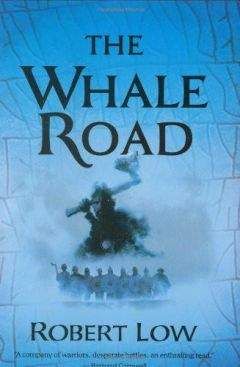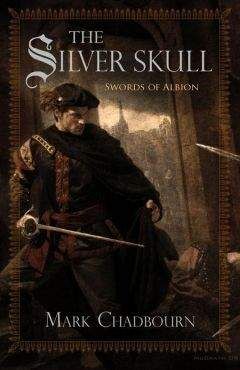'For the good of the tribe,' Camaban replied sourly, 'and you were a priest then, and you'd burned other men's daughters without scruple.'
Haragg flinched as if he had been struck. He was much older than Camaban, but he bowed his head as if accepting the younger man's authority. 'I was wrong,' he said simply.
'Most people are wrong,' Camaban said. 'The world is stuffed with fools, which is why we must change it.' He motioned for Haragg and Saban to squat, though he stayed standing like a master addressing his pupils. 'Lengar has agreed to return Erek's gold if Sarmennyn gives him a temple. He made that agreement because he believes no temple can be moved to Ratharryn, but we are going to prove him wrong.'
'Take this temple,' Haragg said, nodding at the Sea Temple's stark pillars.
'No,' Camaban said. 'We shall find Sarmennyn's best temple and take that one.'
'Why?' Saban asked.
'Why?' Camaban snapped at him. 'Why? Slaol sent Ratharryn his gold. That is a sign, fool, that he wants something of us. What does he want? He wants a temple, of course, because temples are where the gods touch the earth. Slaol wants a temple, and he wants it in Ratharryn, and he sent us gold from Sarmennyn to show us where the temple must come from. Is that so very hard to understand?' He gave Saban a pitying look, then began pacing up and down the short turf. 'He wants a temple from Sarmennyn because here Slaol is worshipped above all the other gods. Here the people have glimpsed part of the truth, and that truth we must carry to the heartland. But there is a greater truth.' He stopped his pacing and stared at his two listeners with a fierce expression. 'I have seen to the heart of all things,' he said softly, then waited for either man to challenge him, but Haragg was just watching him with a worshipful face and Saban had nothing to say.
'The priests believe the world is fixed,' Camaban went on scornfully. 'They believe that nothing changes and that if we obey their rules and make our sacrifices, then nothing will ever change. But the world is changing. It has changed. The pattern is broken.'
'The pattern?' Saban said. Haragg had mentioned the pattern in the north country, but would not explain it. Now Camaban would tell him.
To do so Camaban stooped and plucked an arrow from Saban's quiver, for Saban went nowhere without his yew bow, which was a symbol that he was no longer a slave. Camaban used the arrow's flint point to scratch a wide circle in the turf, gouging it so that the soil showed brown through the sallow grass. He said, 'The circle is the sun's year. We know that circle. We mark it. Here in Sarmennyn they kill a girl each midsummer to show when one circle ends and the same circle begins again. Do you understand that?' He was looking at Saban for Haragg already knew of the broken pattern.
'I understand,' Saban said. At Ratharryn they also marked the circle's end and beginning at midsummer, though they did it by killing a heifer at sunrise rather than a girl at sunset.
'Now for the mystery,' Camaban said, and he gouged a much smaller circle, placing it on the larger scratched ring like a bead on a bronze wire circlet. 'That is Lahanna,' he said, tapping the small circle. 'She is born, she grows' — he was tracing his finger about the bead — 'and dies again. Then she is born again' — he made a new circle, the same size as the first and next to it — 'she grows and dies, and then is born again.' He scratched a third circle. What Camaban had drawn now looked like three beads that almost, but not quite, filled one quadrant of the big circle of the sun. 'She is born, she dies,' he said again and again, drawing more circles until he had made twelve beads, and then he stopped. 'You see?' he said, pointing the arrow's head to the gap between the last and the first bead.
The circle now had twelve beads. 'Twelve moons in each year,' Camaban said, 'but the mystery is here.' He tapped the small space that was left between the first and the last of the moon circles.
Haragg turned to Saban, eager that he should understand. 'The moon's year is shorter than the sun's year.'
Saban understood that. The priests at Ratharryn, indeed priests everywhere, had long noted that the moon's year of twelve swellings and shrinkings was shorter than the sun's great circuit about the sky, but Saban had never thought much about the disparity. It was one of life's constant mysteries, like why stags only wore antlers for part of the year, or where the swallows went in winter. He watched now as Camaban brought a human thigh bone from his bag.
'When I was a child,' Camaban said, 'I sat in our Old Temple and watched the sky. I would go to the Death Place and steal bones, and I would mark the bones like this one.' He gave the bone to Saban. 'Look,' he instructed him, pointing to a series of small marks that had been cut into one long side of the bone. 'Those marks are the days of the sun's year.'
Saban had to hold the bone close, for the marks were tiny, but he could see hundreds of nicks, far too many to count, and each tiny scratch marked a day and a night, adding to a year. 'And these marks' — Camaban showed Saban a second set of scratches that lay parallel to the first — 'are the days of the moon's growing and dying. They show twelve births and twelve deaths.' The second set of marks was fractionally shorter than the first.
Saban again held the bone close to his eyes and used his fingernail to count the extra days on the sun's line. 'Eleven days?' he asked.
'So far as I can tell,' Camaban said. His scornful tone was gone, replaced by an earnest humility. 'But the days are hard to count. I used many bones over many years, and sometimes there was too much cloud and I had to guess the days of the moon, and some years the gap came to more than eleven, and sometimes it was less.' He took the bone back from Camaban. 'But this bone came from the best year, and it tells the same message as all the bones. It tells me that the pattern is broken.'
'The pattern?'
'The circles should meet!' Camaban said fiercely, tapping the diagram he had scratched into the turf. 'That gap' —
he put his finger on the space between the beads — 'is eleven days long. But it should not be there.' He stood again and began to pace. 'To everything in the world there is a purpose,' he said, 'for without purpose there is no meaning. And the meaning is in the pattern. Night and day, man and woman, hunter and prey, the seasons, the tides! They all have a pattern! The stars have a pattern. The sun follows a pattern, the moon follows a pattern, but the two patterns are different, and the world is being split into two.' He pointed towards the sea. 'Some patterns follow the sun, others the moon. The crops come and are cut with the sun, but the tides follow the moon — why? And why did Dilan send the gold to Erek?' He used the Outfolk names for the gods of the sea and the sun, then answered his own question fiercely. 'He sent it so that the sun would take the sea tides back into his pattern!'
'Women follow the moon pattern,' Haragg said gloomily.
'They do?' Camaban sounded surprised.
'In their bleeding,' Haragg said, then shrugged, 'or so I'm told.'
'But everything,' Camaban declared, 'everything should follow the sun! All should be regular, but it isn't.' He pointed again at the pattern in the turf. 'The mystery is how to make the pattern right.'
'How?' Saban asked.
'You tell me,' Camaban said, and Saban understood that the question was not lightly asked.
He stared at the pattern. Think of it, he told himself, as beads on a bronze wire and then the answer was obvious. A man could make more beads, smaller ones, and try to thread them until they filled the wire perfectly, but that would be a laborious task. The simple way to make the beads fit was to shorten the wire, a task that would be easy for any smith. And if the wire were shortened, the big circle would be smaller and the beads would all touch. 'Slaol must be brought closer to the earth?' Saban suggested diffidently.
'Well done,' Camaban said warmly. 'So what does that tell you?'
Saban thought long and hard, then shrugged. 'I don't know.'
'We tell stories about how Slaol and Lahanna loved each other and then became enemies, but those are just stories. They leave something out. Us. Why are we here? We know that the gods made us, but why? Why do we make things? You make a bow — to kill. You make a pot — to hold things. You make a brooch — to fasten a cloak. So we were made for a purpose, but what was that purpose?' He waited for an answer, but neither Haragg nor Saban spoke. 'And why are we flawed?' Camaban asked. 'Would you make a bow that was weak? Or a pot that was cracked? We were not made flawed! The gods would not have made us flawed any more than a potter would make a bowl that was cracked or a smith would make a knife that was blunt, yet we are sick, we are maimed and we are twisted. The gods made us perfect, and we are flawed. Why?' He paused before offering the answer: 'Because we offended Slaol.'
'We did?' Saban asked. He was accustomed to the story that Lahanna had offended Slaol by trying to dim his brightness, but Camaban was now blaming mankind.
'We offended him by worshipping the lesser gods as fervently as we worshipped him,' Camaban said. 'We insulted him, and so he moved away, and now we must draw him back by worshipping him as he is supposed to be worshipped, by giving him his proper place above all the other gods, and by building him a temple that will show him we have understood his pattern. Then he will come back, and when he returns there will be no more winter.'
'No more winter?' Saban asked in astonishment.
'Winter is Slaol's punishment,' Camaban explained. 'We offended him and so he punishes us each and every year. How? By moving away from us. How do we know that? Because the farther you stand from a fire, the less heat you feel. In summer, when Slaol is near us, we feel his heat, but in winter, when things die, his heat goes. It goes because he is far from us, so if we can bring him back then there will be no more winter.' He turned and faced the sun. 'There will be no more winter,' he said again, 'and no more sickness, and no more grief, and no more children crying in the night.' There were tears in his eyes, and Saban remembered the night when Camaban's mother had died and the crooked child had howled like a wolf cub.
'And no more girls will leap into the flames,' Haragg said quietly.
'And you' — Camaban ignored Haragg's words as he turned to Saban — 'will not be a warrior.' He took the yew bow from Saban's shoulder and, with an effort that made him grimace, snapped the stave across his knee. He flung the broken bow across the cliff top so that it fell into the sea. 'You will be a builder, Saban, and you will help Haragg move the temple from Sarmennyn to Ratharryn and so bring the god back to us.'
'If my brother permits it,' Haragg said, speaking of Scathel.
'In time,' Camaban said confidently, 'Scathel will join us. because he will understand that we have seen the truth.' He dropped to his knees and bowed to the sun. 'We have seen the truth,' he said humbly, 'and we shall change the world.'
Saban felt the excitement. They would change the world. At that moment, poised above the sea, he knew that they could.
—«»—«»—«»—
Aurenna, in the time between her elevation to a goddess and her death in the sun's fire, was expected to tour the country and hear the people's prayers that she would carry to her husband. She left Kereval's settlement escorted by four spearmen to guard her, two women to attend her, three priests to guide her and a dozen slaves to serve her, as well as by a crowd of other folk who just wanted to follow the footsteps of the sun bride.
Kereval ruled a land greater in size than Ratharryn's holdings, though it was more thinly settled for Sarmennyn's soil was hard; it was Aurenna's duty to show herself to all the tribe and to the dead in their communal mounds. Each night a hut was cleared of its folk and animals so that the sun bride could sleep in privacy and each morning there was a huddle of petitioners waiting outside the hut. Women begged her to grant them sons, parents pleaded with her to heal their children, warriors asked her to bless their spears and fishermen bowed as she touched their boats and nets. The priests led her from temple to temple and from grave mound to grave mound. They opened the graves, shoving their vast entrance stones aside so that Aurenna could stoop into their cave-like interiors and talk to the dead whose bones lay jumbled in the damp shadows.
Camaban and Saban also accompanied her, following the golden girl to the sheltered valleys on Sarmennyn's south coast where the people farmed and took their long wooden fishing boats out to sea, and then up into the high, bare land of the north where cattle, sheep and the making of stone axes gave a poor living to scattered homesteads. And wherever they went Camaban inspected the temples, looking for the one he wanted moved to Ratharryn. The people, recognising him as a sorcerer, bowed. 'Can you make magic?' Saban asked him one day.
'I turned you into a slave, didn't I?' Camaban retorted.
Saban looked at the scar on his hand. 'That was cruel,' he said.
'Don't be absurd,' Camaban said wearily. 'How else was I to keep you alive? Lengar wanted to kill you, which was entirely the sensible thing to do, but I hoped you might prove useful to me. So I fed him a nonsensical tale about the gods taking revenge on those who killed their half-brothers, then gave him the idea of enslaving you. He liked that. And I wanted you to meet Haragg.'
'I like him,' Saban said warmly.
'You like most people,' Camaban said scornfully. 'Haragg is quite clever,' he went on, 'but you can't trust all his ideas. He's absurdly influenced by his daughter's death! He distrusts ritual, but there's nothing wrong with ritual. It shows the gods that we recognise their power. If we took notice of Haragg's ideas we wouldn't burn Aurenna to death and what is the point of the girl's existence if it isn't to burn?'
Saban looked ahead to where Aurenna walked between her attendant priests. He hated Camaban at that moment, but he said nothing, and Camaban, who knew exactly what his brother was thinking, laughed.
That afternoon they came to another temple, this one a simple circle of five stones that was typical of the shrines in the northern part of Sarmennyn. A few, very few, had as many as a dozen stones, but none of the boulders was as large as those that stood within Cathallo's walls. Sarmennyn's stones were rarely taller than a man nor any thicker than a man's waist, but nearly all of them were squared into trim pillars.
Camaban liked none of the shrines they saw. 'We want a temple that will astonish,' he told Saban. 'We have to find a temple that will tell Slaol we have made a great effort on his behalf. What's the achievement in moving four or five little rocks to Ratharryn?'
Saban reckoned that moving just one stone would be an achievement, and he had begun to doubt that Camaban would ever find the temple he wanted. 'Why don't you just pick any temple?' he asked one night. 'Slaol will know how much effort we made to move it.'
'If I wanted the job done quickly and carelessly,' Camaban said, 'I would have let you find a temple rather than waste my own time searching. Don't be absurd, Saban.' They were eating in a crowded hut where Aurenna's attendants had been greeted with gifts of fish, meat, pelts and pots of liquor. One pot of the liquor could steal a man's brains and legs, though Camaban always seemed unaffected. He drank it like water, belched, drank more, and never slurred his words nor staggered; in the morning, when Saban's head was throbbing and sour, Camaban would be full of energy.
